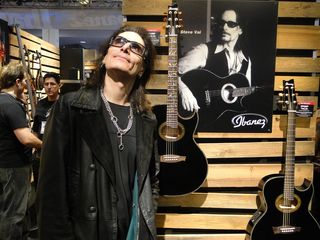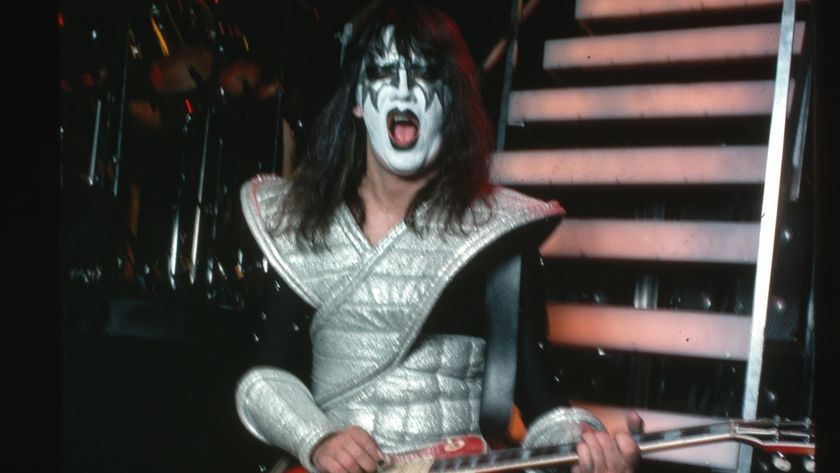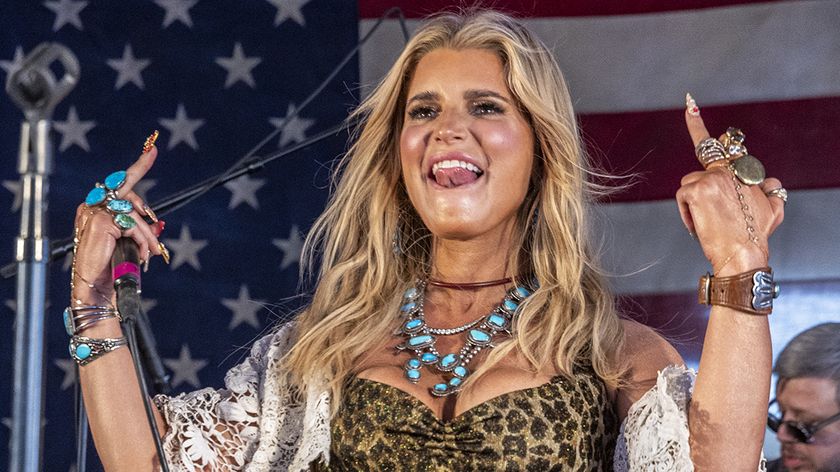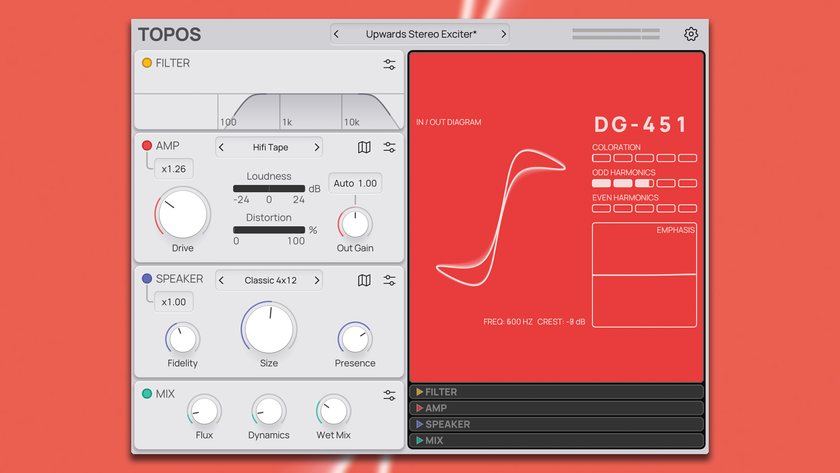
Steve Vai holds many titles - Grammy Award recipient, winner of practically every Best Guitarist poll under the sun - but this week, on 3 March at 1:30pm EST (that's 6:30pm GMT), the celebrated master musician is, uh, 'vying' for another kind of honor when, in conjunction with Berklee College of Music, he attempts to set a Guinness Record for holding the world's largest online guitar lesson.
It's all to promote his upcoming 12-week online course called Steve Vai Guitar Techniques, which another highly influential axman, Nigel Tufnel of Spinal Tap, has been touting on YouTube (see above).
MusicRadar caught up with Vai recently to talk about the course, his attempt to set a world record and, obviously enough, how the great Nigel Tufnel has influenced him. In addition, to help commemorate Solo Week, we asked Vai to offer his thoughts on what makes a guitar solo truly memorable.
Being that the acclaimed guitarist Nigel Tufnel has been so complimentary about your playing, the big question on everybody's minds is this: What have you learned from him?
[laughs] "Oh my God! That's a good one. Well, I'll be honest with you, I'm kind of a simple guy. Give me a new Christopher Guest film or a new Tom Waits record, and I'm happy. I think Christopher is brilliant. I love Spinal Tap, obviously, but all of his films do it for me. His sense of humor is remarkable. I'd put him right up there with Woody Allen.
"The thing about Christopher, though, is that he's a guitar fan, and he really takes music very seriously. He asked me to play on the last Spinal Tap record, which was a thrill and an honor. How could I say no?
"When Berklee asked him to do these promotional films for me, I was a little apprehensive - I didn't want to bug the guy, you know? But he said he'd be glad to, and he did a marvelous job. They're so funny and wonderful and true to his spirit."
Get the MusicRadar Newsletter
Want all the hottest music and gear news, reviews, deals, features and more, direct to your inbox? Sign up here.
When you played on the Spinal Tap record, did you get to touch any of his treasured guitars? Were you allowed to even look at them?
"No, I didn't. [laughs] Actually, I recorded my contribution to the Tap record at my home studio, so I didn't get a chance to see the famous guitar collection. That would have been nice, though."
Well, there's always hope for next time. OK, on to your Berklee online course. How did this all come about?

Vai meets Vai. Steve at Ibanez's NAMM booth last January. © Joe Bosso
"I go way back with Berklee. As you may know, after I graduated high school, I went to Berklee, and it was a wonderful experience. I'm fascinated by the language of music, and I found it to be the perfect place to further my musical education. Being surrounded by people who had so many of the same dreams and aspirations was very inspiring.
"I had to leave Berklee because I started working with Frank Zappa. It was a tough choice, but I had to weigh the two options, and of course, I thought that working with Frank was a chance of a lifetime. But I always liked the idea of teaching. I've done lessons here and there for various charities. And then, a few years ago, I embarked on my Alien Guitar Secrets, which were these classes, and my approach to teaching was very esoteric. What I thought was important, or at least what I would be good at, was showing people how to develop their own personalities on the guitar. In a way, it's something you can't teach - your personality is something that's yours. But you can kind of bring people out of their shells and show them to trust their instincts. That, to me, is something people don't get from other courses or lessons.
"I don't teach scales and chords. I mean, I can, but I don't think people want to come to me for those things. They're more interested in things that are more…personal.
"So what happened was, Berklee started these online courses, and they're great. You sign up and you're in a classroom with, like, 20 other people and an instructor, and you can learn all of these amazing things without having to physically be at the school. After a while, they started to expand, and they asked signature artists to participate. I liked the idea.
"I filmed for a whole day and talked about some esoteric stuff, but also some down-to-earth aspects, as well - how I played this on a record, how I do that. But the biggest thing was answering the 'why?' question. It was more about getting inside my approach to playing as opposed to 'this is how you do that, this is where you put your finger' - all of those mechanics that you can learn anywhere. They chopped up everything I had filmed and made it into a Steve Vai Techniques class.
"It did incredibly well - I was so pleased at the response. They asked me to do another installment, or semester, if you will, and of course, I was more than happy to say yes."
Who thought up this whole 'world's largest online guitar lesson' extravaganza?
"That was Berklee's idea to promote this next semester. At first, I thought it was kind of corny, but then I thought, Why not? It's funny: Whenever you do something like this, there's all of these parameters that Guinness sets, like, it has to be 1000 people online at all times, and it has to be 30 minutes long - all kinds of criteria."
I'm curious: is there already a record for the world's largest online guitar lesson?
[laughs] "Not that I know of. I think we're going for something new here."
And this is taking place on March 3rd at 1:30pm Eastern Standard Time. OK, say I sign up for the lesson - what can I expect?
"I'm not going to get too crazy during the 30 minutes. This is for anybody who wants to play the guitar - and, of course, it's my opinion that everybody should play the instrument. The guitar is cool, it's a relief, it's a liberation. So what I'm going to do is take things from soup to nuts in a very short period of time: intonation, tuning, hearing the notes, habits to get into and habits to avoid, simple theory aspects. It's going to be a big overview, with an emphasis on getting out of the guitar what you want."
People can submit questions to you for this particular lesson. With the amount of folks who are going to be signing up, how many questions do you think you'll be able to get to?
"I have no idea! [laughs] I'm just going to talk and talk, and after a while, I'll start taking questions. But you know me - ask me a question and I can go on and on. You have to tell me to shut up, 'cause I'll keep going." [laughs]
You're going to have to try to keep your answers pretty brief.
"Yes. That will be the biggest challenge right there for me." [laughs]
So that's on the 3rd, and then the next day the second semester of your course starts.
"That's right. You go to Berklee.com, and you'll see my name, and you can sign up. I think it'll offer a lot for players, no matter what their ability level is. When I went to Berklee, there were people who had just picked up the instrument, and then there were people who were simply astonishing. To me, teaching principles is the big thing."
Let me ask you, after filming these courses, what did you learn about yourself as a musician?
"That's a good question. You know, when you're teaching or you're talking about what you do…you discover a lot about your own confidence. And confidence is one of the most important aspects of doing anything well, especially playing an instrument.
"To me, teaching isn't so much about showing people 'rules' per se; it's more about letting people in on…opinions. And not so much opinions, but truths - in this case, my truths: 'This is what works for me. This is how I go about doing…whatever.' I'm bringing people inside and showing them the things that I believe in strongly.
"I think if you can do that convincingly and sincerely, you help people become motivated and give them incentive. Stirring that interest in people - if I can accomplish that, then I'll feel very good about the whole thing. And it's happened already, so I'm looking forward to doing it again."
Well, I'm sold! I'm signing up.
[laughs] "There you go! Well, log on to Berklee.com."
On an unrelated note, this is Solo Week on MusicRadar. You've certainly played your share of amazing solos over the years. But what is your philosophy about soloing? To you, what goes into creating a brilliant guitar solo?
"To me, a great solo is in the ears of the listener. A great guitar solo is art, and the thing about art is, it's so subjective. Somebody might hear one of my solos and think it's the greatest thing in the world; other people might have a totally different response because what they want to hear is a jazz solo.
"But to me, a great solo is when an artist can find something that's unique to them. If they can find that and capture it and express it sincerely, then it's a great solo."
Joe is a freelance journalist who has, over the past few decades, interviewed hundreds of guitarists for Guitar World, Guitar Player, MusicRadar and Classic Rock. He is also a former editor of Guitar World, contributing writer for Guitar Aficionado and VP of A&R for Island Records. He’s an enthusiastic guitarist, but he’s nowhere near the likes of the people he interviews. Surprisingly, his skills are more suited to the drums. If you need a drummer for your Beatles tribute band, look him up.

“Those arpeggios... That was the sickest thing I ever heard”: Yngwie Malmsteen on why guitarists should take inspiration from players of other instruments if they want to develop their own style

“I used a flange on the main riff and a wah-wah on the solo. I just said, ‘Hit the record button and I’ll let it rip!’”: Kiss legend Ace Frehley on his greatest cult classic song










